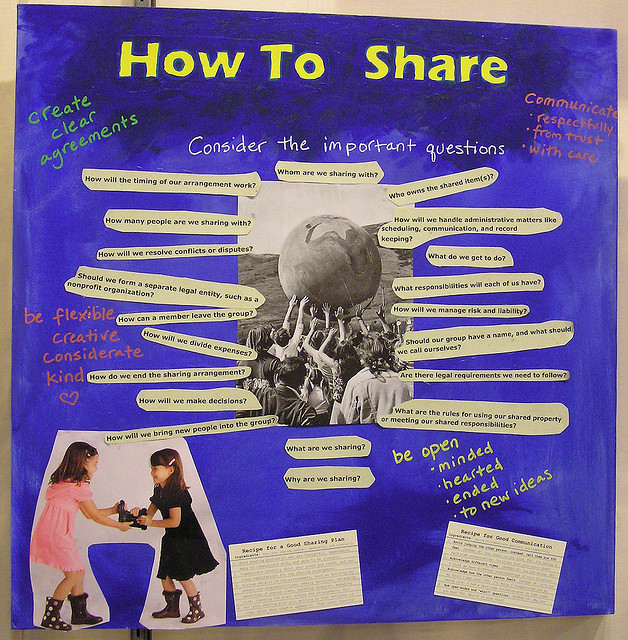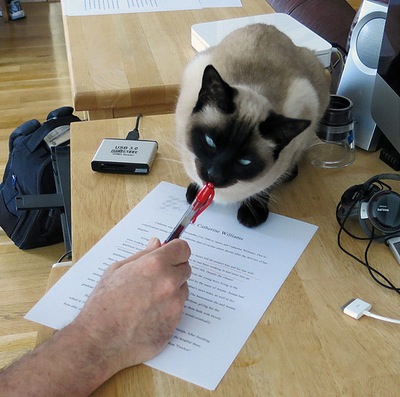For week four of the Why Open? course, we are looking at potential benefits of openness, as well as potential problems with it. There are many, many interesting stories and case studies listed on that part of the course, and I’m still working through looking at them (I’m interested in them all!).
For this post, I decided to add in another story that has recently come to my attention, and that hits home for me as an academic.
Rosie Redfield, Professor in the department of Zoology at the University of British Columbia, recently blogged about an issue that a colleague had experienced with an open access publication: after publishing in an open access journal (PLOS One), which puts a CC-BY (Creative Commons Attribution) license on published articles, she discovered that her research paper had been included in a collection of papers published by Apple Academic Press, for which the publisher was charging over $100 Canadian.
Now, this may not seem so bad, because, after all, the CC-BY license allows this. It allows others to do anything they want with one’s work, so long as one is cited as the original author. So it would seem not to be the case that the publisher is doing anything wrong (that’s what I thought at first), and what’s really at issue here is authors not knowing that this sort of thing could happen. Thus it would seem that education about what CC-BY allows is all that is really needed (that’s also what I thought at first).
And even if the publisher is charging a lot of money for a book with open access articles in it, those articles still remain open access to be viewed by anyone, so no harm done, right?
Wrong. As I started reading more of Redfield’s posts on this issue, and when I read the results of a survey she did of researchers, I started to see some of the complications of the situation. Then when I met with her in person last week, I came to realize the nuances of what is happening and the potential problems that can result, both for researchers and for the public.
What’s the problem?
This is not simply a matter of authors being upset that someone else is making money off of their work (though as the survey results show, some do have that concern)–there are other problems as well. These are not listed in any particular order, but rather the order in which they’re coming to mind for me.
1. One might argue, as some of the authors in the survey did, that a publisher is making a profit off an open access work becomes more of a concern when authors have to pay a fee to publish in many open access journals (or to publish an article as open access in non-open access journals). Here’s a pretty thorough list of scholarly journal publishers and their “article processing charges” (APC’s). I was once asked if I wanted to pay over $2000 to have a 2-3 page book review published as open access in an otherwise closed journal. I decided the book review just wasn’t that good.
The point is, it’s not just that some people are upset that others are making money off their work, but rather that they had to pay to publish their work open access, and they did this because they wanted the work available for others to view for free. Well, of course, it isn’t always individuals paying these APC’s–people can use grants to do so, and/or they can get funding to do so from their institution, just to name a couple of other sources of the money.
A rebuttal could be: well, the articles are still available to view for free, on the journal’s website, and likely other places around the web as well. This brings up the next problem.
2. Just because the articles are available for free elsewhere doesn’t mean the people who see the book in which they’ve been republished, and which is selling for a good chunk of money, are able to find that out easily. The problem with this particular book that Redfield talks about in her blog is that there was no indication at all that these were open access articles, and that they are available for free on the web. Of course not–that would mean no one would buy the book. Several authors in Redfield’s survey mention that they think such books should have to list the original source of the publication.
So people looking for scientific research may see the book and think they need to buy it to get access to the research. I find this quite troubling, as for me, the point of open access publishing is to allow people access to research without having to pay. That people are ending up getting duped into paying is a problem, in my view.
And it’s not just individuals, libraries may be buying such books (and using public funds to do so), as suggested in a comment on one of Redfield’s blog posts on this issue (the comment also mentions some other important downsides as well). When I met with her, Redfield told me she had spoken to a librarian at the University of British Columbia libraries, who said that they had about 50 of Apple Academic Press’s titles. Redfield was in the process of getting these titles to find out whether any of them are republications of open access articles.
Redfield notes in a blog post that actually, according to the terms of PLOS One, anyone who redistributes an article for that journal must also “make clear the license terms under which the work was published.” The same is true for the license terms of BioMed Central. Upon looking into the legal code of the CC-BY 3.0 unported license, it seems to me that this sort of thing is required by the CC-BY license itself. It says, in section 4(a), here, that “You must include a copy of, or the Uniform Resource Identifier (URI) for, this License with every copy of the Work You Distribute or Publicly Perform.” I had forgotten this, but of course I include a link to the CC license for any CC-licensed image I use on this blog, for example, precisely for that reason.
The PLOS One license terms also say that the redistribution of articles from PLOS journals must include citation not only of the author, but also of the original source. So do the Wiley Online Open terms (which allow you to publish an open-access article in an otherwise non-open access journal). And Taylor and Francis and Routledge Open too. I’m not going to do an exhaustive search of all open journals, or journals that allow open-access content, to see what their terms are. The point is that such terms do exist, and at least in the case where the article from PLOS One was republished without citing the original source and license, such terms were violated.
3. The articles in the book Redfield talks about were edited to some degree from how they appeared in the original publications (I’m not sure how much, exactly). Of course, the CC-BY license allows others to “adapt” the work, so this is not a problem in itself. The problem comes in when one thinks about what might be possible, such as book editors making fairly significant changes to an article that, even by accident, end up making the argument weaker or suggest claims that the author would not have made him/herself.
Then, what comes into the picture is potential harm for the author, from people thinking they’ve said things they haven’t, and wouldn’t, say (if those things put the author in a bad light because they make the argument worse, or the data analysis worse, etc.). A number of the authors in Redfield’s survey said they would be worried about possible misrepresentation of the authors’ interpretations of results. Other authors worried that others might think they had self-plagiarized–published the same thing twice, without citing their earlier publication.
It might seem on the surface that the CC-BY license allows such things to happen, but as Redfield points out in one of her blog posts, CC-BY (and all CC licenses that have “attribution” as one of their requirements) have a “no endorsement” clause: those who use a work licensed CC-BY and alter it in some way, must not indicate that the original author endorses the revision of the work. The legal code of the CC-BY license makes this even clearer–see section 4(b)(iv) here.
Since the publisher of the work Redfield discusses listed the authors as “contributors,” and did not state that the articles had been previously published elsewhere and edited for publication in the book, one could make the case that the way they’ve presented the articles suggests “endorsement” by the authors. Redfield argues for this point here.
But since the authors in this case were not told that their articles were going to be published in the book, they did not have a chance to give an endorsement or not. Nor does CC-BY require that original creators of works with a CC-BY license be informed that their works are being reused and adapted.
What should be done?
My first thought, upon seeing the first one or two of Redfield’s blog posts, was that this problem could be solved by simply educating authors about the various CC licenses, and about what is allowed under CC-BY, so they can decide whether they want to use CC-BY or some other license. I thought that those who wanted to avoid the problems noted above could choose a different license, like perhaps CC-BY-SA (share-alike)–which would require that any use of the work have an equivalent license on it, possibly reducing incentives to republish collections of such works–or CC-BY-ND (no derivatives)–which would not allow anything to be changed. There are several problems with this response.
1. It may not be the case that authors have a choice of licenses when publishing in an open access journal, or when publishing an open access article in an otherwise non-open access journal. PLOS One, for example, does not give you a choice–you have to use CC-BY or not publish there. So do BioMedCentral and PeerJ and Sage Open. Some publishers do allow a choice, such as Wiley (you can choose a license for your open access article in an otherwise non-open access journal), and Taylor and Francis.
But those who are worried about reuse of CC-BY articles might just choose not to publish in the OA journals that require CC-BY (this does not apply to researchers who are mandated to publish open access as CC-BY, of course). Unless some other things change. Like possibly the following.
2. As noted above, the republishing of open access articles without citing the original publications and licenses under which they were published may be in violation of the license terms of the original articles. If so, then it seems logical that legal action should be taken against the publishers who violate those terms. This is what Redfield suggests in a blog post.
I agree, but who should take such legal action? It’s too much to ask for individual authors to take legal action, unless they can find legal counsel who will take on the case without charging anything, or very much. Who among us has enough money to pay attorneys and other fees to sue a publisher?
Redfield suggests perhaps the journal publishers should take on the duty of suing such book publishers, which seems to me to make sense because the book publishers are violating the terms of the journal publishers’ own licenses. But this raises other issues, as discussed in the comments to that post (authors are the ones with legal standing to sue because they hold copyright, journals may have to raise article processing fees to cover such activities).
One might also ask: what motivation do journals have to go after publishers who are redistributing content that the journal is not making money from each time it is accessed anyway? They have made money through other means than subscriptions or fee for access, so would they be motivated to try to stop such republication? Perhaps, if enough authors shy away from publishing open access articles because of fears of this sort of thing happening.
Conclusion
The bigger point here is the following. Even if you don’t think this is a big deal (and many don’t, as evidenced by comments on Redfield’s blog posts about this issue), it appears that there are a good number of authors who do, and who may then choose not to publish in open access journals because of it. This is ignoring the point, of course, that many researchers are now being mandated to do so; there are still quite a few who are not…though this may change soon.
Even if a journal allows a choice of licenses, authors may wonder if, were it to be the case that the license was violated, they or someone else would be able to take action to do something about it. And if no one is doing anything about it, then what’s to stop this sort of thing from spreading further, if it’s lucrative?
Whether it is a profit-making business, whether significant numbers of individuals and libraries are buying such books, remains to be seen. And the more that authors are required to publish open access works, the more this sort of thing might become lucrative, if it isn’t already. But I think this is an issue worth paying attention to and trying to figure out what can and should be done about the violation of open access licenses in open access journals, even if one doesn’t think that has happened in this particular case.



